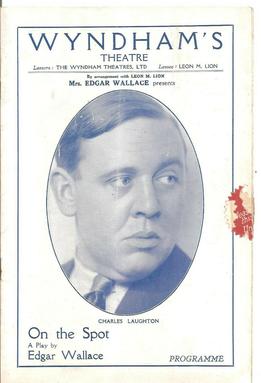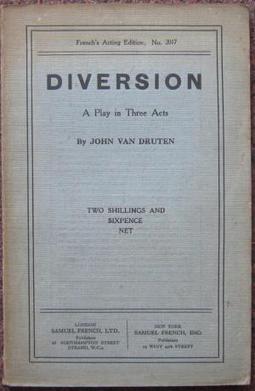Related Research Articles

On the Spot is a 1930 Chicago-set play by the British writer Edgar Wallace. Wallace was inspired by a visit to the United States and, in particular, the Saint Valentine's Day Massacre. Known as a prolific author, he reportedly dictated the manuscript for the play in just four days. It was his greatest theatrical success.
The Old Man is a 1931 mystery play by the British writer Edgar Wallace. Its original production was staged at Wyndham's Theatre in London's West End for a ninety performance run. It is set entirely in the "Coat of Arms" tavern where a mysterious old man lurks in the background, reputedly an escapee from a lunatic asylum. The original cast included Alfred Drayton, Jack Melford, Harold Warrender and Finlay Currie.
The Terror is a 1927 mystery thriller play by the British writer Edgar Wallace. It is based on Wallace's 1926 novel The Black Abbot.
The Outsider is a play by the British writer Dorothy Brandon. It portrays the struggle of an unorthodox medical practitioner to gain acceptance by the medical establishment. It was subsequently revised to show the unconventional triumphing over the conventional, whereas the play had originally had the opposite ending.
Dorothy Brandon was a British playwright active in the interwar years. Her greatest West End success was the 1923 medical drama The Outsider which was revived several times, and adapted into films on three occasions.

Diversion is a 1927 play by the British writer John Van Druten. It was first staged in the United States at the Lyceum Theatre in Rochester before beginning a 68 run performance at the 49th Street Theatre in 1928. In London it ran for a combined 101 performances at the Arts Theatre and Little Theatre between 26 September and 22 December 1928. The cast included Maurice Evans, C.V. France, Cathleen Nesbitt and Mignon O'Doherty.

There's Always Juliet is a 1931 comedy play by the British writer John Van Druten about an American architect who falls in love with an Englishwoman.
The River is a 1925 play by the British writer Patrick Hastings. It is set in West Africa, where two diamond hunters are in love with the same woman.
They Came to a City is a 1943 play by the British writer J.B. Priestley.

Blondie White is a 1937 mystery play by British writer Jeffrey Dell and Bernard Merivale. A murder mystery, it was inspired by an earlier play by Hungarian writer Ladislas Fodor. A famous crime novelist helps Scotland Yard to solve the murder of a nightclub performer, Blondie White.

The Man in Half Moon Street is a 1939 play by the British writer Barré Lyndon.

Other Men's Wives is a 1928 comedy play by the British-American writer Walter C. Hackett set in a French hotel.

Our Betters is a comedy play by the British writer Somerset Maugham. Set in Mayfair and a country house in Suffolk, the plot revolves around the interaction between newly wealthy Americans and upper-class British society.

Escapade is a 1952 play by the British writer Roger MacDougall.

Grand National Night is a 1945 thriller play by the British writers Campbell Christie and Dorothy Christie. A racehorse owner quarrels and accidentally kills his wife on the evening of the Grand National.
Peter Blackmore (1909–1984) was a British playwright and screenwriter. His play Miranda was adapted into the 1948 film of the same title. He also wrote the comedy play The Blue Goose which appeared in the West End in 1941. His 1953 play Down Came a Blackbird ran for 53 performances at the Savoy Theatre. He worked on the screenplays for a number of comedy films for British Lion and the Rank Organisation, including two Norman Wisdom vehicles.

Seagulls Over Sorrento is a play by Hugh Hastings, an Australian who had served in the Royal Navy during the Second World War.
A Soldier for Christmas is a 1944 comedy play by the British actor and playwright Reginald Beckwith. It was staged twice in London's West End that year. Between 3 February and 22 April it ran at Wyndham's Theatre before transferring to the Vaudeville Theatre where it continued between 25 April and 8 July, running for a total of 181 performances. It was then revived and ran for a further 34 performances at the Playhouse Theatre between 6 October and 4 November 1944. The West End cast included Trevor Howard, Robert Beatty, Joyce Barbour, Joan Harben and Jane Cain.

They Walk Alone is a 1938 thriller play by the British writer Max Catto. After premiering at the Q Theatre in Kew Bridge, it transferred to London's West End where it ran for 156 performances between 19 January and 3 June 1939 initially at the Shaftesbury Theatre before switching to the Comedy Theatre. The cast included Beckett Bould, Jimmy Hanley, Rene Ray, Carol Goodner and Beatrix Lehmann. It was produced by Berthold Viertel. It also ran for 21 performances at the Shubert Theatre on Broadway in 1941.

Murder Mistaken is a 1952 thriller play by the British author Janet Green. It first appeared at the Prince of Wales Theatre in Cardiff under the title Teddy Bare's Picnic. It then transferred to London's West End under its new title first at the Ambassadors Theatre and then at the Vaudeville Theatre. It's West End run lasted 156 performances between 4 November 1952 and 28 March 1953. The West End cast included Derek Farr, Anthony Marlowe, Phyllis Morris, Iris Hoey, Brenda de Banzie, Patricia Burke and Rosalie Crutchley. It appeared on Broadway under the alternative title Gently Does It, lasting for thirty seven performances at the Playhouse Theatre. Green wrote a novelisation in 1953 with Leonard Gribble.